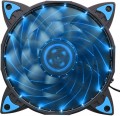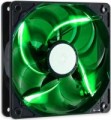Max. RPM
The highest speed at which the cooling system fan is capable of operating; for models without a speed controller (see below), this item indicates the nominal rotation speed. In the "slowest" modern fans, the maximum speed
does not exceed 1000 rpm, in the "fastest" it can be up
to 2500 rpm and even
more.
Note that this parameter is closely related to the fan diameter (see above): the smaller the diameter, the higher the speed must be to achieve the desired airflow values. In this case, the rotation speed directly affects the level of noise and vibration. Therefore, it is believed that the required volume of air is best provided by large and relatively "slow" fans; and it makes sense to use "fast" small models where compactness is crucial. If we compare the speed of models of the same size, then higher speeds have a positive effect on performance, but increase not only the noise level, but also the price and power consumption.
Max. air flow
The maximum airflow that a cooling fan can create; measured in CFM — cubic feet per minute.
The higher the CFM number, the more efficient the fan. On the other hand, high performance requires either a large diameter (which affects the size and cost) or high speed (which increases the noise and vibration levels). Therefore, when choosing, it makes sense not to chase the maximum air flow, but to use special formulas that allow you to calculate the required number of CFM depending on the type and power of the cooled component and other parameters. Such formulas can be found in special sources. As for specific numbers, in the most modest systems, the performance
does not exceed 30 CFM, and in the most powerful systems it can be up to 80 CFM and even
more.
It is also worth considering that the actual value of the air flow at the highest speed is usually lower than the claimed maximum; see Static Pressure for details.
MTBF
The total time that a cooling fan is guaranteed to run before it fails. Note that when this time is exhausted, the device will not necessarily break — many modern fans have a significant margin of safety and are able to work for some more period. At the same time, it is worth evaluating the overall durability of the cooling system according to this parameter.
Lighting colour
The colour of the backlight installed in the cooling system.
See above for more details on the backlight itself. Also note here that in the illumination of modern cooling systems there is both one colour (most often
red or
blue, less often
green,
yellow,
white or
purple), and multi-colour systems such as
RGB and
ARGB. The choice of a single-colour backlight depends mainly on aesthetic preferences, but the last two varieties should be touched upon separately.
The basic principle of operation of both RGB and ARGB systems is the same: the design provides for a set of LEDs of three basic colours — red (Red), green (Green) and blue (Blue), and by changing the number and brightness of the included LEDs, you can not only intensity, but and tint of light. The difference between these options differs in functionality: RGB systems support a limited set of colours (usually up to one and a half dozen, or even less), while ARGB allows you to choose almost any shade from the entire available colour range. At the same time, both of them can support backlight synchronization (see below); in general, this function is not required for RGB and ARGB systems, but it is used almost exclusively in them.

